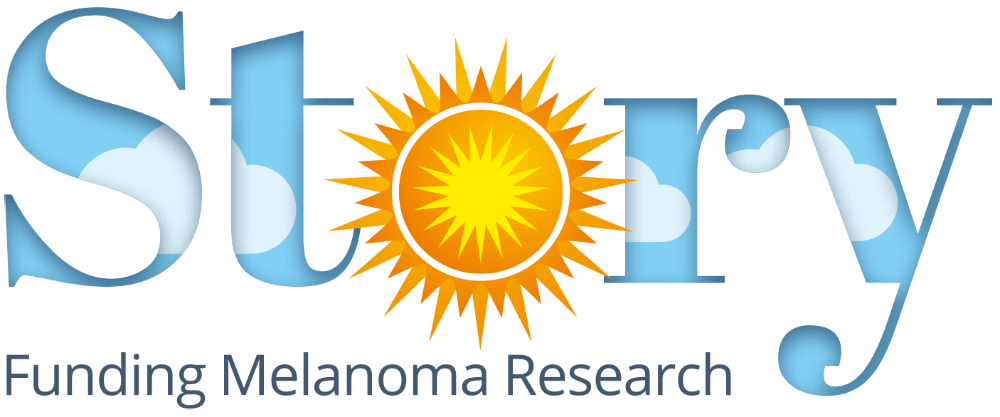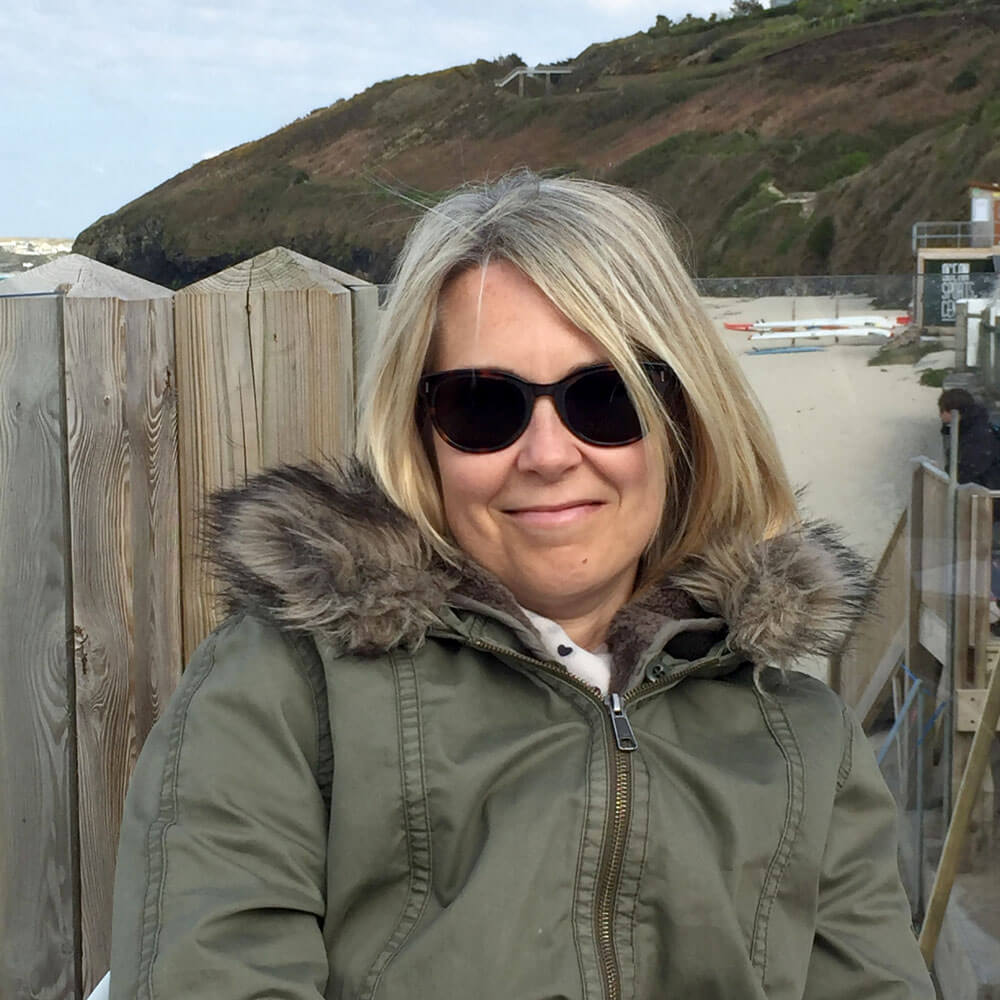I met Natalie Waghorn in a pretty yoga café in the market town of Godalming, where she works as a Marketing Executive for a well-known travel company. Bright, friendly and energetic, she looked the picture of health and I found her courage and determination deeply inspiring. Natalie is kindly sharing her story with us.
If its not too painful for you, please could you share your initial diagnosis – what happened, and what led to you seeking help?
I’d had a brown mark on the corner of my forehead right on the hairline from my late twenties. During summer of 2014 I became more aware of it – it became itchy and slightly scaly. I don’t really know what led me to going to the GP, but thank goodness something did! I’d never been one to visit the GP regularly and didn’t know the GPs at my surgery that well, but through going to see one of them on a different health issue I decided to visit her again to ask her to check it out. Initially I felt a bit pretentious and making a mountain out of a molehill! From my initial visit she determined that I had a fungal infection and prescribed some cream, but on closer inspection she said she could see something under the skin which I needed to keep an eye on and return should I see any changes in its appearance.
Sure enough, in time it did change and a very navy blue mark became visible. After a visit back to the GP I was referred, on an emergency appointment, to the dermatology department at the Royal Surrey County Hospital where they agreed that it should be removed and arranged for me to be booked in for day surgery. The date for this arrived and off I set to the Royal Surrey for what I thought was going to be a straightforward procedure. I met the surgeon and he looked at the mark on my forehead. He then asked it bothered me for which I replied not really as from a visual point of view my hair covered it so not terribly noticeable. Due to its location the surgeon was worried about the wound healing so we agreed to take a biopsy and test to see if it showed anything untoward and if it was OK, then we would leave it alone.
Just over a week later I got the call from the receptionist at the Maxillofacial Unit at the Royal Surrey asking me to come in for an appointment the following day. I kind of knew then that something wasn’t quite right, but it didn’t prepare me for what the Consultant told me!
How advanced was the disease, and what treatments were given?
The disease was middle staged advanced – I think the melanoma was around 2mm in thickness. The Consultant explained that she would arrange for me to have it removed after the Christmas holidays and at the same time they would perform a sentinel node biopsy to see if the cancer had spread to my lymph nodes. After the initial surgery to remove the melanoma and replace with a skin graft it was discovered that it had spread to the lymph nodes in my neck and a second surgery was arranged to have these removed. After this I received the news that all had been successful and the cancer had been eradicated. As you can imagine I was overjoyed, but my cancer journey resumed 9 months later when I discovered a lump on my breast. Again the hospital moved swiftly and biopsies were arranged which showed the cancer had returned and a PET Scan showed that it was also on my lungs.
This is when I was introduced to Dr Ajaz and the team at St. Luke’s. The plan was that I would start off taking some inhibitor drugs (dabrafenib) for a period of approximately 6 months and then I would transfer to immunotherapy (pembrolizumab). After taking the inhibitor drugs for 2 months I was concerned as to whether they were having any effect. During a Zumba class one weekend I struggled badly with my coordination – it was like my brain and legs were not talking to one another. It was then that we discovered that the cancer had spread to my brain and that the inhibitor drugs had failed. But the golden Plan B of immunotherapy was still there and this was put into action along with a course of stereotactic radiosurgery at another hospital.
That is a lot for anyone to go through; and I believe that you had other family problems to deal with at the same time?
Yes, around the time I was diagnosed with cancer my Mum was diagnosed with Alzheimer’s. During my initial treatment I didn’t reveal to her that I had cancer as I knew she would find this a lot to take on board along with her own situation. Once it spread to my brain and I had to give up driving I could no longer keep it from her, but even then I only told her the bare minimum. All in all it was a very stressful and difficult time for the family.
I know that Dr Ajaz and his team always advise reducing stress in patients’ lives to allow mind and body to concentrate on recovery. I believe that giving up work was not an option for you – please could you tell us a little about how you coped with this?
I didn’t want to give up work as I was determined to keep my life as ‘normal’ as possible and not let the cancer completely take over. Yes it was there, but I wanted to feel that I was in charge and not to give it any more attention than it deserved. In fact I found coming to work actually helped as it was nice to interact with my colleagues and it gave me a focus away from cancer and Mum.
Could I ask you about Yoga and how this has helped you?
I took up Yoga and also Pilates primarily to improve my core strength which in turn would aid my running. It did help with that, but I also found that the hour spent practicing either one of these benefitted my general well being too. During the class it gave me time to focus my mind, forget all that was going on and let all the tension escape by concentrating on my breathing. I also took time to make sure I was eating the correct foods during this time. With the treatment I was undergoing I thought it was even more important to eat foods that were nutritionally beneficial to me. A well balanced diet was my priority and to make sure I replenished my body with the correct food groups after exercising. During my cancer journey I did modify my exercise accordingly. It’s important to listen to your body and not exhaust yourself – I would emphasise that to point to anybody reading this. Whilst overall wellbeing plays an important part this is very dependent on the individual and how you are reacting to your treatment.
What was your lowest point, and how did you deal with this?
A My worst nightmare was the cancer going to my brain so it was particularly hard when it was confirmed that this had happened. Due to this I had to surrender my driving licence which made me feel like my independence had been taken away. I talked earlier about how I wanted to be in charge, but at this point I felt it tipped the balance and it was 60:40 in the cancer’s favour. Being without a car had a huge impact on my life as where I live there is little public transport on your doorstep so everything took twice as long to do.
How do you feel about the treatments you received, and the support you were given? Could more have been done to help you?
The treatment I have received has been a-may-zing! I have had the best medical team supporting me, both medically and emotionally – I couldn’t have asked for more. Every question, big or small, was answered and I felt I could ask anything – even the most silliest of things! They were extremely sympathetic with the situation with my Mum and always made sure I was supported with this in any way that they could.
I know that you are kindly planning to do some fundraising for Story FMR – please could you tell us a little about this?
Since being diagnosed with cancer I have taken up running and to date I have run numerous 10k’s plus two half marathons – the best one was the Great North Run in September last year. Never in my wildest dreams did I ever think I could achieve running a half marathon so despite there being some tough times during my illness something positive did come about and I was able to give something back to Dr Ajaz and the team at St. Luke’s thanks to the generosity of my family, friends and colleagues. So I plan to embark on further half marathons and one day I would love to tackle the London Marathon and to run that and raise money for Story FMR would be fantastic.
Natalie has bravely tackled all the obstacles in her path on this cancer journey, staying in charge of the disease and showing it who’s boss. She has one further message for you. If you have a mark on your skin that you are just not happy about, press ahead and insist that it is checked out properly. It could save your life.




